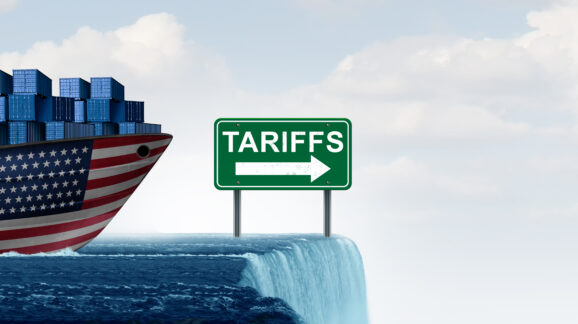A tariff-funded UBI? Trump just gave progressives their blueprint

Photo Credit: Getty
Donald Trump’s pitch for a $2,000 “tariff dividend” check to be issued sometime next year (during election season) is being marketed as a windfall for working families and framed as a simple affordability booster by White House officials.
But its deeper significance, as I describe in Forbes, lies in its fusion of trade regulation, ongoing industrial policy schemes, and welfare expansion into a prototype that will add to progressives’ toolbox for eventually realizing their dream of a universal basic income (UBI) and the permanent custodial administrative state it will enable. Conservatives and libertarians should be alarmed.
What’s new isn’t the idea of yet another stimulus payment, but the proposed mechanism. Turning tariffs into a revenue stream for household payouts weds protectionism to redistribution in a malignant way. Just as left-leaning critics barely objected to Trump’s earlier partial nationalizations of private companies, they are unlikely to oppose this move either. The allure of government control over corporations and creating a new welfare lever is simply too great.
The math is untenable. One estimate from the Committee for a Responsible Federal Budget suggests such tariff checks, if structured like the COVID-era stimulus payments, could run about $600 billion per round. Tariffs raise consumer prices and depress economic activity. They don’t actually generate any stable “profit” from which to fund “dividends,” yet Trump also proposes using the same cash flow to pay down the national debt. Both are impossible.
Worse are the political dynamics. The COVID-era relief structure—expanded unemployment benefits, refundable tax credits, and cash payments—created de facto UBI pilots that normalized routine federal checks, even for households whose incomes never changed. The public has been conditioned to expect the next round of payments whenever the next crisis arrives, and some policymakers want to make such cash payments permanent fixtures.
Trump’s redistribution venture arrives at a moment when the UBI plot has been embraced by the UN and the World Economic Forum. Numerous US states have engaged in pilot projects, generally deemed “successful” from the progressive nanny-state perspective. The rise of AI is now the dominant excuse for implementing UBI.
A tariff-based dividend accelerates this trend, but is even worse in the novel way it weaponizes regulation itself. Instead of responding to an external shock like COVID or the 2008 financial crisis, Trump’s tariff dividend “responds” to a purely self-inflicted wound—disruptions and higher prices caused by trade barriers.
The lesson progressives are learning is not merely to “never let a crisis go to waste.” It now extends to engineering their own crisis levers: using general tax receipts to justify stipend checks, as in the past, while also “entrepreneurially” tweaking trade barriers to generate “revenue” and distribute checks.
Trump has just delivered to progressives a turnkey mechanism for a future “American People’s Dividend” indexed to whatever priority Washington wants to manipulate—climate, equity, public health, or industrial policy. Does anyone think they’ll refuse this gift?
This is also how helicopter government becomes further entrenched, as the conditions for receiving federal checks will involve yielding to greater government intrusions into households’ private affairs.
Every crisis-era payout has made the next one more politically inevitable. We have called for an Abuse-of-Crisis Prevention Act to end these predations in response to external economic shock. Now, a self-inflicted “shock” may help cement the UBI logic for good. Members in Trump’s cabinet and in Congress need to object strenuously.
For more see:
“Trump’s $2,000 Tariff Checks: The Backdoor UBI Conservatives Should Fear,” Forbes
“Universal Basic Income and the Custodial Administrative State,” Competitive Enterprise Institute
“Universal Basic Income: What’s the Plural of Apocalypse?” Forbes
“Framing an ‘Abuse-of-Crisis Prevention Act’ to Confine the Federal Government,” Social Science Research Network